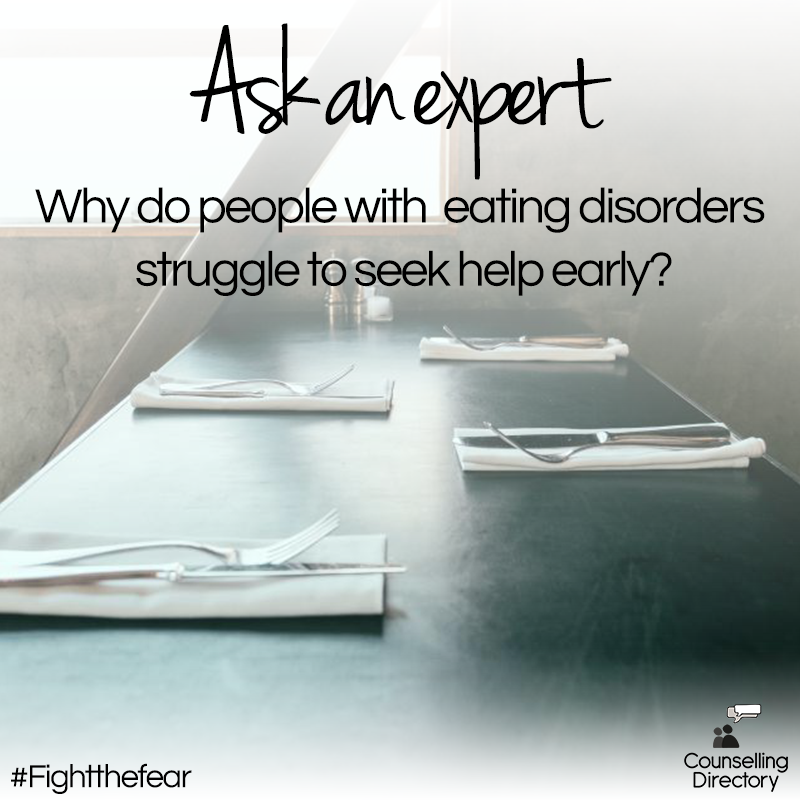Eating disorders: Why is it so hard to seek help early?
However, it is these first steps that are often the hardest. To understand why many people do not seek help early, we spoke to psychotherapist and eating disorder specialist, Charlotte McLaughlin. Charlotte supports people to recover from eating disorders and transform their relationship with food and their bodies in her London clinics and over skype.

Why do people with eating disorders struggle to seek help early?
It evokes sadness and frustration in me when I see the statistics and how many people suffering from eating disorders are not seeking help.
In my practice, it is quite rare for me to come across people who have recently developed issues with eating. More commonly, they have been struggling with this illness for years; destructive and unhealthy patterns becoming entrenched, hardwired, and wreaking havoc in their lives. They come to my clinic feeling out of control, and no longer able to manage. Of course, recovery is still possible for this category of sufferers, but the hard facts are that the sooner you seek treatment, the greater likelihood of full recovery.
This is why I feel so passionate about developing awareness and encouraging people to reach out as soon as they may detect something isn’t right with their relationship to food, eating, their bodies, and ultimately their relationship with themselves. You want to give yourself the greatest chance of being free from this; reaching out for help is the first step.
The reasons people don’t seek help early enough are multifaceted. The lack of understanding and awareness around it can make it harder for sufferers to be aware that they’ve developed (or are on the brink of developing) an eating disorder. More dangerously, though, the nature of the illness means people may be in denial. The illness can get very clever at convincing you that ‘you don’t really have it’ or that ‘things aren’t that bad’.
Even if sufferers have come to accept that there is a problem, a whole host of other barriers may arise, preventing them from seeking help. Fear of recovery is a big one. What does recovery actually mean? What will I have to do? What will I not be allowed to do? Will I get fat? How will I cope without my eating disorder? Will I lose control? Often people are terrified of the change that they may experience in their bodies, for instance gaining weight. These are all natural fears, part of the illness.
Even when people I work with have finally taken the courageous step in reaching out to me, it doesn’t mean the fear of recovery dissolves. In fact, this is usually when the fear monkeys start screaming even more loudly! If not attended to, this has the potential to sabotage recovery. Acknowledging and working compassionately with all the different fears that may be present is an important part of the therapeutic work.
Another reason sufferers may not seek treatment once they’ve accepted they have a problem is due to shame. People often feel weak for feeling and behaving so out of control. Although things are improving, there is still a huge amount of shame surrounding mental illness. Shame has the power to silence sufferers; eating disorders usually exist shrouded in shame, silence and secrecy.
For men I meet suffering from eating disorders, the shame is often more pronounced. It does seem even harder for them to reach out for help with an issue that is a supposedly female denominated phenomenon. The appearance of seeming ‘non-masculine’ can be a barrier to seeking help.
People develop eating disorders for many complex interrelated reasons. There is always a reason, though; no one is born suffering from this. It has developed due to a myriad of contributory factors and has served some kind of a purpose in the sufferer’s life. So despite the havoc the eating disorder is causing, there can be an attachment to it, and understandably a real reluctance to let this coping strategy go. Working with this conflict is essential for the successful treatment of the illness.
Eating disorders are complex, but recovery is absolutely possible. Confronting it is the first step. The benefits of seeking treatment early are so pronounced and I urge anyone that is struggling with or suspects someone may be struggling with this to reach out to an experienced professional as soon as possible. This is a courageous act, but you deserve to be free. Reaching out for help is the first step to reclaiming this freedom.

Find a therapist dealing with Eating disorders
All therapists are verified professionals





